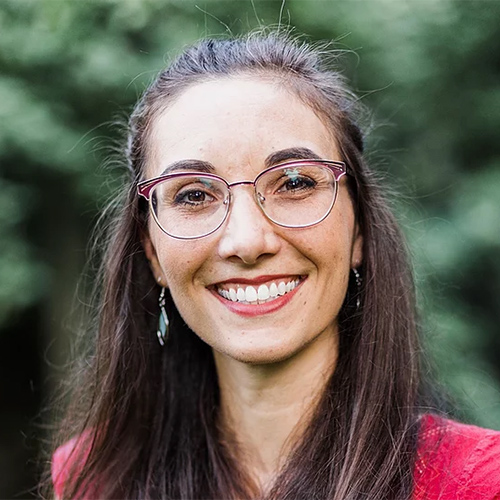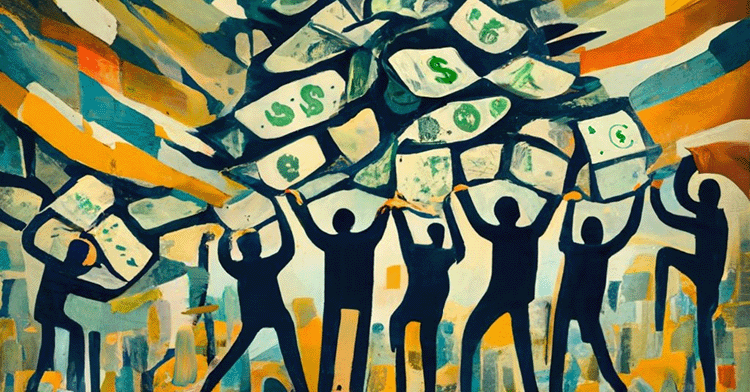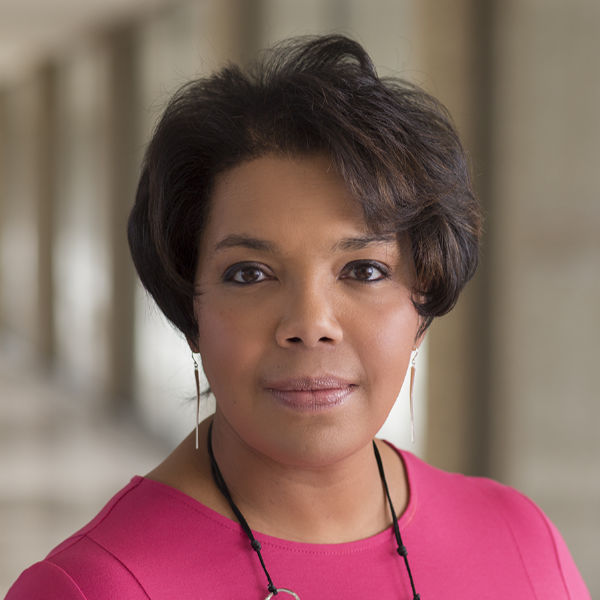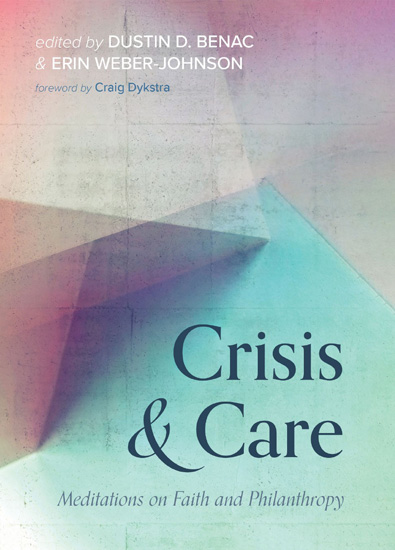Editor’s Note: The following is adapted from a keynote address by the Rev. Janice Virtue, presented Feb. 20, 2009, at “Sharing God’s Abundance,” the Quadrennial Training Event of the General Council on Finance and Administration of the United Methodist Church.
I hope to do three things: first, I hope to put the current story of our economic life into the larger story of God’s ongoing presence in the world. Second, I want to explore the biblical and theological character of abundance. And finally, I want to think with you about what it means to lead in this time.
As Christians, we are part of a story that began a very long time ago and will continue well beyond us. Our spiritual ancestors spent their lives building the church that we now have. They weren’t perfect, but they did create all the wealth and assets that we now have. When the next generation looks back on this time, their judgment will not be about the quality of this conference; it will be about whether we allowed faith or fear to rule our actions.
Sam Wells, the dean of Duke Chapel, writes in “Improvisation: The Drama of Christian Ethics” that the Christian story is like a five-act drama. The first act is creation and, in it, the Triune God’s abundant love spills over into the world creating all that is and was and will be. The second act is Israel. It is the story of God’s relentless pursuit of the people of God, a pursuit that is full of both promise and warning. The third act is Jesus, where God fully reveals God’s character to the world. The fourth act, the act that we are now in, is the church, the body of believers living in the already-and-not-yet of God’s reign. The fifth act is the eschaton, and it belongs fully to God. We don’t know what that will be or when it will be, and it isn’t ours to know. It is God’s.
Now the problem with living in act four of this drama is that we have a tendency to vacillate between two incomplete understandings of our reality. The first is a spiritualization of our role in the world. If God is ultimately the one who will make things right, then we don’t have to do anything. God will provide, even if the mortgage on our building is being called by the bank or we can’t make payroll. The apostle Paul asks if we should sin more so that grace can abound, and, of course, the answer is no. The fifth act of our drama does belong to God, but in the meantime we are called to live and act according to the discipline of our faith.
But therein lies the problem. I’m sure more of us lean toward the other incomplete understanding of our fourth-act life. Most of us, I would guess, live in a hyper-responsibility, a belief that if we don’t take charge, no one will or that the future of the church belongs to us. Parker Palmer calls this our functional atheism. Yes, we believe in God and that God will have the final say, but we act like we are really in charge!
So here is the challenge of living in this part of God’s story. When we choose the middle way between these two extremes, we understand that we do have responsibility and God will provide. We understand that we must act and that God will have the final act. In this middle ground, we find freedom -- freedom to imagine possibility and to take risks for the sake of the Kingdom, freedom for playfulness and creativity, freedom to relax and wonder just what God is up to and what is needed of us, freedom to hear again God’s call and to respond faithfully.
So here’s the first point: When we locate our current reality in the full story of God’s work in the world, we find that we can relax a little. This economic crisis is not the worst thing that has ever happened to God’s people. We can trust God to be God and know that God will prevail. The end game isn’t this year or next; it isn’t even likely in our lifetime. The endgame belongs to God, and it’s called the reign of God. Even as you make hard decisions, you can still have a sense of humor and a sense of playfulness. And above all else, you can see that in the grand sweep of time God will bring something new from this latest wrinkle in our story.
I want to turn now to this business of abundance. On what grounds do we claim that we are to share God’s abundance? Biblical scholar Walter Brueggemann has been my teacher about the narrative of God’s abundance contained in our Scriptures. From the very first word, Brueggemann argues, our story is a story of abundance. Listen to his words in a lecture for the United Church in Australia: “The Bible is about abundance. From the first chapters of Genesis, God not only initiates abundance -- calling forth plants and fish and birds and animals -- but promises continued abundance by commanding them to ‘increase and multiply’ (1:22). God’s generosity and fidelity reach their climax on the sixth day, when God proclaims a sufficiency for ‘everything that has the breath of life’ and declares all this ‘very good’ (1:30-31).”
Scarcity, he argues, doesn’t show up until Pharaoh has a dream about a famine in the land. Up until then, blessing was the order of the world. God instructs Abraham and Sarah and all their family -- that includes you and me -- to be a blessing to the world, to be the force of well-being in the world, to be the reminder that creation includes enough of everything for everything. But then Pharaoh has a dream, and he sets forth the systems to control and monopolize the food supply. In the first year of the famine, the people give up their land for food. In the second year they give up their cattle. And in the third, they give up all they have left -- their children. “Pharaoh introduces the principle of scarcity into the world economy,” Brueggemann says. “For the first time in the Bible, someone says, ‘There’s not enough. Let’s get everything.’”
From that point forward, we have struggled to remember that there is enough, that, from the very moment of its founding, the world God created and that we inhabit has enough. The Bible offers story after story about God’s ongoing offer of abundance and our stubborn insistence on scarcity. Slavery for the Israelites was hard -- harder than anything most of us can imagine. And yet, they multiplied, so much so that Pharaoh ordered the midwives to kill all the boy babies.
In spite of all his manipulation and brutality, Pharaoh could not control the people of God. They continued to multiply, until an exasperated and fearful Pharaoh ordered Moses and Aaron to take their abundant people and leave. “Oh, and on your way out of town,” Pharaoh says, “Could you bless us with whatever it is you have?”
In one sweeping story, the villain -- the creator of scarcity, the one who enslaves in the name of greed, the one who stores up all the treasure he can find -- concedes to the Creator of the universe and asks for a blessing. Brueggemann points out to us in an essay in the Christian Century, “This text shows that the power of the future is not in the hands of those who believe in scarcity and monopolize the world’s resources; it is in the hands of those who trust God’s abundance.”
So I say to you, Church, you must choose: Will you live according to Pharaoh’s rules or God’s rules? Will you live according to Pharaoh’s rules, where some have lots and many have nothing, or will you live according to God’s rules, where all have enough and abundance shows up in the most surprising ways? If we listen to our Scriptures, we must acknowledge that even in the midst of unprecedented financial crisis, the future will belong to those who trust in and live by the truth of God’s abundance.
There are plenty more examples of our ancestors learning about God’s surprising abundance in places of scarcity. In Exodus we learn of manna in the wilderness, the prophet Elijah finds sustenance in surprising places, and Joshua finds allies among the strangest of partners. These texts ask us to wonder what surprises God has for us and what partners are waiting for us to join them in accomplishing a new work.
Of course, there are also plenty of examples in Scripture of our ongoing inability to believe in God’s abundance, to believe that there is enough for all and to order our lives accordingly. Here I want to draw your attention to the two feeding narratives in Mark’s Gospel. In both chapters 6 and 8, you will find stories of Jesus feeding the masses: first 5,000 people and then 4,000 people. I love these stories, but I’ve always wondered why there are two. Did this really happen twice? Did some ancient redactor want to tell his version of the story and so included it twice? Was there some mess-up with the manuscripts?
Listen to these stories and think with me about what might be going on here. What does God want to teach us?
Feeding the Five Thousand (Mark 6:30-44)
The apostles gathered around Jesus, and told him all that they had done and taught. He said to them, ‘Come away to a deserted place all by yourselves and rest a while.’ For many were coming and going, and they had no leisure even to eat. And they went away in the boat to a deserted place by themselves. Now many saw them going and recognized them, and they hurried there on foot from all the towns and arrived ahead of them. As he went ashore, he saw a great crowd; and he had compassion for them, because they were like sheep without a shepherd; and he began to teach them many things. When it grew late, his disciples came to him and said, ‘This is a deserted place, and the hour is now very late; send them away so that they may go into the surrounding country and villages and buy something for themselves to eat.’ But he answered them, ‘You give them something to eat.’ They said to him, ‘Are we to go and buy two hundred denarii worth of bread, and give it to them to eat?’ And he said to them, ‘How many loaves have you? Go and see.’ When they had found out, they said, ‘Five, and two fish.’ Then he ordered them to get all the people to sit down in groups on the green grass. So they sat down in groups of hundreds and of fifties. Taking the five loaves and the two fish, he looked up to heaven, and blessed and broke the loaves, and gave them to his disciples to set before the people; and he divided the two fish among them all. And all ate and were filled; and they took up 12 baskets full of broken pieces and of the fish. Those who had eaten the loaves numbered 5,000 men.
Just two short chapters later, we have this story:
Feeding the Four Thousand (Mark 8:1-3)
In those days when there was again a great crowd without anything to eat, he called his disciples and said to them, ‘I have compassion for the crowd, because they have been with me now for three days and have nothing to eat. If I send them away hungry to their homes, they will faint on the way -- and some of them have come from a great distance.’
Now, at this point in the story, we expect the disciples to start collecting loaves and fishes or at the very least to say to Jesus, “Hey, do you want us to do what we did before? You know, collect what people have and let you bless them?” Instead they say, “How can one feed these people with bread here in the desert?” Apparently, the disciples had not only failed to learn from their previous experience (noted just two chapters before), but they also forgot the story of bread, of manna, in the wilderness. Now this might be the place to point out that Mark loves to paint a picture of the disciples as slow-witted followers. Mark’s disciples are frequently one step behind. But I think something else might be going on here. Do you see it?
I think that we are not so very different from the disciples in these two stories. You can hear the absolute pragmatism in the disciples’ question -- where is the food, the money, the resources going to come from? No matter what the Biblical story says or what we’ve experienced, we’re still in the real world and that real world is tough. The fear of scarcity, of not having enough, is so ingrained in us that our memory of abundance is slow and vague. The world wants to teach us to store up our treasures, to build our bank accounts and add to our stores. The world approves when the cemetery fund is wisely invested while children in our neighborhood go to school hungry. Watch out for yourself, the world says; take care of your own, grab your piece of the pie before someone else gets it. The gospel, on the other hand, invites us to share our pie, to sit in the company of others and care about their needs, to trust that blessing is more powerful than any market. It invites us to believe, down to our very souls, that with God all things are possible, including that our church -- the wonderful, gifted and flawed United Methodist Church – can navigate this crisis and come out stronger on the other side.
Abundance. From the very beginning until now. It’s the drumbeat of our story. If you listen, you’ll hear it.
Now, finally, to the questions many of you may be facing: What am I to do? How do I lead in this time? What does it mean to be one of the church’s leaders in this time?
First, let me say very clearly that you are our leaders. Please embrace your leadership. You have the knowledge and the experience to help our church navigate this particular time. Too often I see petty battles and arguments prevent knowledgeable people from being leaders. Don’t let that be you. Sometimes we want to look for people outside ourselves to rescue us -- President Obama and the government, perhaps, or maybe our general secretaries and bishops, or maybe our large church pastors. “It’s not our job,” we want to say. “It’s theirs.” Don’t let that be you. This economic challenge will take all of us, and you have an important role to play. We need your wisdom. We need your imagination. We need your courage.
In this great forging time, I hope we can put away some of our most cherished stereotypes and judgments. Let’s banish the ideas that all accountants are naysayers and gatekeepers and all pastors are afraid to talk about money. Where those images are real, let’s work to change them rather than complain about them. Let’s put away the long-tired battle between finance and program -- who in the world is that old saw serving? As long as we are judging one another, we’ll never share our bread or our best ideas. And this is a time for our best ideas and our greatest commitments. You are the leaders God has raised up. Please lead.
And, even as you step into leadership, please do not forget the lesson of the loaves and fishes. The story teaches us about abundance in community. We can’t go it alone. Now more than ever co-labor -- collaboration -- is required. No one among you will be our savior. No general agency will be the hero for the day. It’s our time to sit down in our groups of 50 and 100 and to share what we have -- our resources, our money, our knowledge and our power. It’s time for us to revive the brilliance of being a connectional church and actually to be it.
Wendell Berry is one of my all-time favorite writers. In one of his poems he says, “We pray not for a new Earth and heaven, but to be quiet in heart and in eye clear. What we need is here.” I take this to mean that we don’t need God to press reboot and start all over with heaven and Earth. I also take it to mean that what we need -- all the wisdom, skill, imagination and vision -- is here, right here … it’s you. What we need is here. The way forward for our church will be found among you.
It is worth noting that the gospel calls us to be saints, not heroes. Heroes are solitary figures, with at most a rather inept sidekick. Think Batman and Robin. They act autonomously and believe that all that is good or evil rests on their action. Only a few people get to be heroes and everyone knows about them. Saints, on the other hand, are rather inconspicuous and fairly numerous. I’m certain every one of you can name more than a handful. Saints aren’t afraid of making mistakes because they know about restoration and new creation. And most importantly, saints don’t go it alone. Of the 64 references to saints in the New Testament, all are plural. Saints are never alone. Saints, Sam Wells writes in “Improvisation,” know about abundance in community.
The best strategic advice for our time may come from John Wesley in a sermon titled, “The Use of Money.” In it, he laid out the formula that I’m sure is well-known to you: “earn all you can, save all you can and give all you can.” Even in an economic downturn, earn all you can. Keep teaching stewardship, keep asking for money, keep putting God’s compelling vision before the people and let them make it happen. Don’t let your own anxiety keep you from these tasks -- teach, ask and do it again. Teach, ask and do it again. Earn all you can.
Now when Wesley said “save all you can,” he wasn’t talking about our 401(k)s or our church endowments. He was talking about being frugal, about limiting our expenses. You already know that this is the time to restructure, to work smarter, not harder, to define the stop-doing as well as the start-doing lists. I suspect that this is the easiest of Wesley’s instructions to carry out.
So before you get carried away by the fantasy of cost-cutting, let me also remind you that Wesley said “give all you can.” He means you personally, but he also means us corporately. Give to the poor, fund the mission and the program that address the needs of the imprisoned, the widowed and the hungry. We earn and we save, according to Wesley, so we can give. In Wesley’s day he noted that it was easy for people to think about the earning part, a little more difficult to think about the saving part and very difficult to do the giving part. In 1789, two years before his death, Wesley wrote this instruction on giving, “Have you reason to believe that 500 of these are to be found among 50,000 Methodists?” Friends, that’s only 1 percent. He continued, “And, yet, nothing can be more plain that that all who observe the first rules without the third will be twofold more the children of hell than ever they were before.” May that not be so with you.
Campbell Harvey is a professor of international business at Duke’s Fuqua School of Business. He’s one of those guys who holds a named chair and is regularly sought out by others for his point of view. He met with a group of religious leaders not too long ago and said that much of this unprecedented recession is the result of greed and moral hazard. What we are in, he said, is an ethical dilemma, and the way we’ve been doing business must change. And then this man who is quoted regularly in the Wall Street Journal and The New York Times said, “I believe there is an opportunity for Christian leaders to show the world that there is another way. Now is not the time for tweaking things. Now is the time for making structural changes that might have been too radical before. We must act boldly and seize this opportunity.”
Now is the time for Christian leaders to show the world that there is another way. A way marked by blessing. A way that begins and ends with God. A way that does not forget that abundance was present in the beginning of time and will be present for all time. A way that does not forget that each person must offer his or her leadership. A way that does not forget that in community we will find life abundant.
Sharing God’s abundance. It’s more than a conference title. It’s a mandate, our manifesto for today. It works for me. I hope it does for you.








